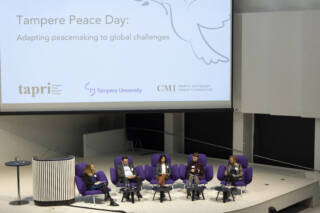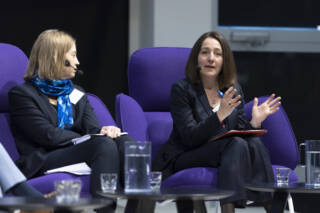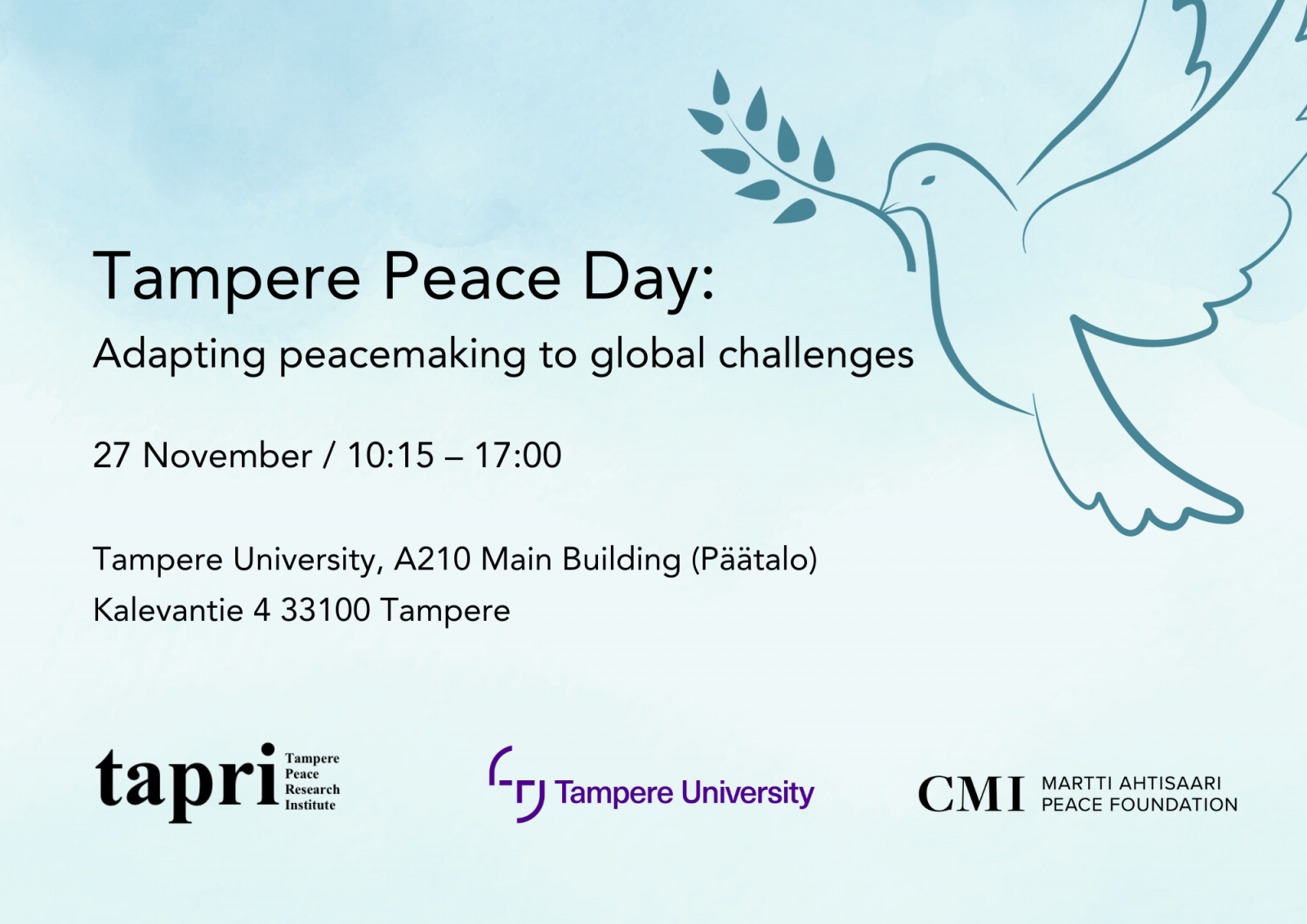Tampere Peace Day: Adapting peacemaking to respond to global challenges
The first Tampere Peace Day, jointly organised by Tampere Peace Research Institute (TAPRI) and CMI – Martti Ahtisaari Peace Foundation (CMI), will be a platform for individuals and organisations working on conflict and peace to come together to discuss how to adapt to current global challenges and work for a peaceful tomorrow. The aim of the day is to bring together the newest research with practical knowledge on peacemaking. The shared platform will enable knowledge and best-practice sharing and create space to foster collaboration and partnerships between all those working toward peace within Finland. There has never been a greater need for new opening and visions of peace to address complex challenges in a troubled world.
- Date: 27 November
- Time: 10:15 AM – 17:00 PM
- Location: Tampere University, A210 Main Building (Päätalo)
- Address: Kalevantie 4, 33100 Tampere
- Followed by Reception, from 17:30 – 19:00, hosted by City of Tampere at the Old City Hall (address Keskustori 10)
Summary of the Inaugural Tampere Peace Day
The inaugural Tampere Peace Day, jointly organized by the Tampere Peace Research Institute (TAPRI) and CMI – Martti Ahtisaari Peace Foundation (CMI), was held on November 27, 2023. This event served as a platform for peace and conflict researchers and practitioners in the field of peacemaking to engage in discussions regarding the intricate challenges that impede the effectiveness of mediation and peacemaking in the current turbulent times.
The event encompassed a wide range of challenges, including the contestations to multilateralism, the proliferation of military conflicts worldwide, encompassing civil wars and territorial disputes, as well as the prevailing polarization and lack of trust towards existing multilateral institutions.
 While the panelists addressed the mounting contestations to the global order and peace efforts, it was also acknowledged that the pursuit of peace and peacemaking has never been devoid of difficulties throughout history, even though the current degree of contestations is particularly marked in the post-World War II era. Despite causing turbulences in the field of peacemaking, these contemporary contestations provide an opportunity to reassess peacemaking approaches and adapt to present challenges, while simultaneously emphasizing the importance of continuous improvement in mediation and peacemaking practices, with due consideration for local traditions and culture.
While the panelists addressed the mounting contestations to the global order and peace efforts, it was also acknowledged that the pursuit of peace and peacemaking has never been devoid of difficulties throughout history, even though the current degree of contestations is particularly marked in the post-World War II era. Despite causing turbulences in the field of peacemaking, these contemporary contestations provide an opportunity to reassess peacemaking approaches and adapt to present challenges, while simultaneously emphasizing the importance of continuous improvement in mediation and peacemaking practices, with due consideration for local traditions and culture.
 The audience highlighted the inseparable nature of peace and conflict research in the Nordic tradition of research, emphasizing that a comprehensive understanding of the underlying causes and grievances that give rise to violent conflicts is essential for designing successful peacemaking efforts. It was underscored that peacemaking can achieve positive outcomes when grounded in rigorous research and an in-depth understanding of the complexities of conflicts. Consequently, the integration of peace research and practice are more than ever needed to ensure meaningful and research-based practices.
The audience highlighted the inseparable nature of peace and conflict research in the Nordic tradition of research, emphasizing that a comprehensive understanding of the underlying causes and grievances that give rise to violent conflicts is essential for designing successful peacemaking efforts. It was underscored that peacemaking can achieve positive outcomes when grounded in rigorous research and an in-depth understanding of the complexities of conflicts. Consequently, the integration of peace research and practice are more than ever needed to ensure meaningful and research-based practices.
Congratulations to the organizers, I believe it was a great way to start the first of a series of yearly conferences – TPD 2023 Participant
(Photo Credits: Maria Santto / CMI )
Agenda of Tampere Peace Day 2023:
10:15 – 10:30 Opening Remarks by Keijo Hämäläinen, President (Rector) of the Tampere University, Janne Taalas, Chief Executive Officer at CMI – Martti Ahtisaari Peace Foundation, and Marko Lehti, Research Director of Tampere Peace Research Institute (TAPRI)
10:30 – 11:15 Keynote address Peacebuilding in Turbulent Times by Sarah von Billerbeck, Professor of International Relations at University of Reading
11:15 – 12:30 Panel discussion followed by Q&A
Navigating New Frontiers of Peace: Challenges to Traditional Approaches of Peacemaking
In a world marked by shifting dynamics and complex global challenges, the traditional approaches to peacemaking are encountering a multitude of obstacles. This panel brings together academic experts and practitioners from the peacebuilding sector to examine the evolving global landscape and delve into the pressing challenges that confront them. The speakers will explore the complex web of issues, each providing insights into the limitations these challenges impose on the effectiveness of mediation and peacebuilding efforts.
Panelists: Cedric de Coning, Research Professor with the peace, conflict and development research group at the Norwegian Institute of International Affairs (NUPI) and a senior advisor for ACCORD, Jibecke Joensson, Head of the CMI’s Brussels Office (CMI – Martti Ahtisaari Peace Foundation), Marko Lehti, Research Director of Tampere Peace Research Institute (TAPRI), Nina Suomalainen, Senior Manager at CMI – Martti Ahtisaari Peace Foundation
Moderated by Matthias Wevelsiep, Director of Programs and Operations at the Network for Religious and Traditional Peacemakers
12:30 – 13:30 Lunch
13:30 – 14:45 Breakout sessions (three in parrallel)
(A) Feminist approaches to locally-led peace
This roundtable discussion is designed to give a platform to feminist approaches to peace and peacebuilding, from the perspective of both research and praxis. Looking at questions of national leadership and agency, it will examine bottom-up peace approaches.
Panelists: Birgit Poopuu, Associate Professor of International Relations and Head of the International Relations and Futures Studies study area at Tallinn University, Elisa Tarnaala, Senior Advisor at CMI – Martti Ahtisaari Peace Foundation, María Martín de Almagro, Assistant Professor at the Department of Conflict and Development Studies at the University of Ghent, Riina Isotalo, Senior Adviser at Felm
Co-moderated by Laura Hendry, Project Manager at CMI – Martti Ahtisaari Peace Foundation and Louise Ridden, Postdoctoral Research Fellow at Tampere University
(B) Inclusive peacemaking in inter-state conflict: the cases of Ukraine and South Caucasus
In the context of the war in Ukraine, discussions about peace focus on military victory, security guarantees, and negotiations among state leaders. Instead of focusing on how the war eventually comes to an end, this panel will shift the discussion to the role of inclusive civil society centric processes in inter-state wars. In addition to Ukraine, this discussion will also examine the South Caucasus region.
Panelists: Andrea Chmielinski Bigazzi, Manager at CMI – Martti Ahtisaari Peace Foundation, South Caucasus Region, Lina Klymenko, University Researcher at Helsinki Collegium for Advanced Studies, Natalia Bezkhlibna, Head of NGO “Community of Professionals”, Tanja Tamminen, Team Leader of an EU-funded project EU4Dialogue
Moderated by Marko Lehti, Director of Tampere Peace Research Institute (TAPRI)
(C) Green transition – an obstacle for just peace and planetary futures?
Green transition has created both high hopes, but also fears and concrete examples that it fuels and triggers, with the increasing demand for new natural resources and commodification of environment, new forms of conflicts and violence. Most known examples relate to that of extraction of key minerals on indigenous lands, such as Sápmiland, and locating windmills and solar energy farms to fragile ecologies. Similar logics of frontier extractivism leading to land acquisitions, soil degradation, loss of biodiversity, and food/seed/soil sovereignty, also relate to ‘superfoods’ and natural fibres such as sisal and rattan that are promoted as alternatives to plastic. Thus, green transition raises questions of social inclusion such as migrants, people with lower incomes, peasants in just futures.
This roundtable is part of the Research Council of Finland supported project (EnVi(r)oCare 2023-27) led by PI Marjaana Jauhola.
Panelists: Rauna Kuokkanen, Research Professor of Arctic Indigenous Studies at the University of Lapland (Finland) and Adjunct Professor of Political Science at the University of Toronto, Ruby van der Wekken, Member of Oma Maa food co-operative and Commons.fi, Sabaheta Ramčilović-Suominen, Associate Research Professor and Academy of Finland Fellow at Natural Resources Institute Finland (Luke)/Luonnonvarakeskus (Luke), Sonja Finér, Executive director at Finnwatch ry.
Moderated by Marjaana Jauhola, Senior Research Fellow, Tampere Peace Research Institute
14:45 – 15:15 Coffee break
15:15 – 16:30 Panel discussion followed by Q&A
Adapting Peacemaking to Diverse Global Realities: Beyond Universalism and Liberal Peace?
This panel builds upon the insights of the previous sessions to move beyond critique, to consider adaptations and opportunities for peacemaking and peacebuilding beyond universal liberal peace. The panel will shed light on new approaches, diverse actors, and policies shaping the practice of mediation and peacebuilding. Moreover, the panel will create space for discussion on the most effective means of bolstering inclusive peace practices and supporting locally driven peace initiatives in response to international and geopolitical challenges.
Panelists: Georg Charpentier, Senior Advisor at CMI – Martti Ahtisaari Peace Foundation, Isabel Bramsen, Associate Professor | Director Peace and Conflict Studies at Lund University, Tarja Väyrynen, Professor of Peace and Conflict Research at Tampere Peace Research Institute, Yasmeen Al-Eryani, Co-Executive Director for Knowledge Production, Sanaa Center for Strategic Studies
Moderated by Johanna Poutanen, Head of Women in Peacemaking and Digital Peacemaking at CMI – Martti Ahtisaari Peace Foundation
16:30 – 17:00 Concluding remarks and closing of the event by Katja Ahlfors, Director at Centre for Peace Mediation, Hanna Klinge, Deputy CEO at CMI – Martti Ahtisaari Peace Foundation, and Marko Lehti, Research Director of Tampere Peace Research Institute (TAPRI)
Followed by reception: Hosted by City of Tampere at the Old City Hall, address Keskustori 10
Read more about our speakers here.

